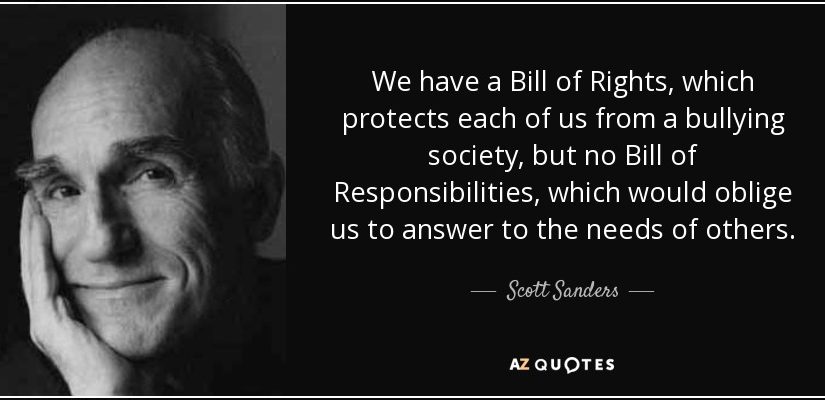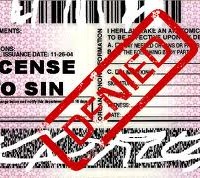Freedom is a word that gets thrown around a lot here in the US. Especially in an election year. ESPECIALLY especially in THIS election year. Vote for (fill in the blank) because OUR FREEDOM IS AT STAKE!!! Another word that we use interchangeably with this kind of freedom is “rights.” Our Constitution has a Bill of Rights. We have the right to do this, or not to do that. Don’t you dare violate my rights! But Christians are called to a different, I would even say higher, form of freedom. While American freedom is preoccupied with individual rights, Christian freedom is about communal responsibilities.
Loving your neighbor calls for the realization that you are part of something bigger, a member of a larger body. Within the Church, we refer to ourselves as the Body of Christ. However, any community is also a body, whether it is a household, neighborhood, city, state, or country.
No one lives in a vacuum. What we do affects others, whether we can see it or not. A HUGE problem in our society is that people have forgotten the basic principle that every action has an equal and opposite reaction. Paul addressed this problem in the church at Corinth in this way:
There’s a slogan often quoted on matters like this: “All things are permitted.” Yes, but not all things are beneficial. “All things are permitted,” they say. Yes, but not all things build up and strengthen others in the body. We should stop looking out for our own interests and instead focus on the people living and breathing around us. 1 Corinthians 10:23-24 (The VOICE)
Yes, we have rights. Yes, we have the freedom of speech; therefore, yes, we ought to be able to speak truth, whenever and wherever and amongst whomever we find ourselves. Technically. However…
Just because we can doesn’t always mean that we should.
Here is something you might not have considered. Even if you’re right in what you say, someone hearing it may not have a full understanding of the issue at hand. If someone questions you out of simple ignorance, you can gently educate them to build them up to where you are. However, if you argue, shout them down or otherwise dig in your heels to assert your rightness, not only are you failing to get your own point across effectively, you are also making it less likely that the other person will ask other significant questions in the future.
Furthermore, they may likely develop an attitude about you as a person, and by extension any group with which you are affiliated, that is closed off and hostile. Can you see how potentially devastating it can be when Christians behave this way? Great job Ace, you won an argument that you never should have been in (slow hand clap), and you lost a soul for the Kingdom in the process. You exercised your Constitutional right to voice your opinion, but you broke God’s commandment to love your neighbor.
It all comes down to the question of rights. If you’re only focused on your own, sooner or later, you’re going to be depriving someone else of theirs. Rights are about exercising your freedom. However, responsibility is the freedom to lay aside your rights for the greater good, just as Jesus laid aside His divinity to come down here with us.
For example, freedom of speech is great until you say something that isn’t true, and it spreads like COVID on the Internet. By that point (and it only takes hours in this age of technology), it’s too late for an apology or retraction. The damage is done and is not likely to be undone.
For this reason, love dictates that the freedom of speech should be in submission to the responsibility to speak truthfully, and to lift others up instead of tearing them down. As Paul directed the Ephesians:
Do not use harmful words, but only helpful words, the kind that build up and provide what is needed, so that what you say will do good to those who hear you. Ephesians 4:29 (GNT)
This is useful advice in any context, but especially on social media. Here are some questions every Truthseeker should ask themselves before posting:
-
- Is what I am saying building up orders according to their needs?
- Do I even know what those needs are? (I.e., Did I really listen to what they were saying?)
- Have I tested my own perceptions and beliefs before questioning theirs?
- Do I for sure know what I’m talking about, or am I about to spout an opinion based on emotion rather than reasoning?
- What effect might my words have for those lurking on this post or page that aren’t directly involved in the conversation?
- What is my motivation for making this post? Am I trying to illuminate Truth or win an argument?
- If a non-believer reads this post, is it going to make them more curious to see what this God thing is all about, or will it make them say, “See, I told you those people were all ignorant douchebags.”
The best practice we can all learn is to do everything we can to widen the gap between stimulus and response. It’s easy to feel anger. It’s harder, but more beneficial, to take a breath, think things through, and respond constructively. It requires wisdom to understand that sometimes the most constructive and loving response is no response at all.



